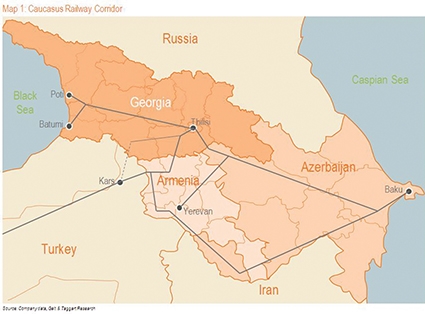Georgian Rail Transit is Declining
Rail transit through the territory of Georgia has been steadily declining, as indicated by the final statistics for 2016 published by the Office of Georgian Railways (GR). In fact, the volume has decreased by 49% over the past four years.
Experts blame inefficient management for the decline and are urging the government to radically reorganize the industry.
Statistics, published on the GR website, describe the serious crisis in the Georgian rail industry. Where, in 2012, 20 million tons of cargo was transported by railroad, by the end of last year this figure had fallen to 11 million. Note, in the same period, cargo traffic from China through Central Asia to Europe has grown seven times.
According to the head of Corridor Research Center, Paata Tsagareishvili, the reduction of transit-related factors has both external and internal causes.
"One of the reasons is that, in recent years, countries in the region have redirected much of their oil through pipelines. However, that only explains 20-25% of the reduced transit. In addition, according to the country's transit corridor, Azerbaijan and Georgia have been unable to agree on a unified tariff policy. At the same time, Georgia’s contribution to the development of the infrastructure is below even criticism, directly affecting the speed of improvement of transportation. As a result, the transit corridor passing through Georgia is becoming less and less attractive."
The main way out, experts agree, is a radical reorganization of the sector, as GR management continues to work in Soviet patterns with continued corruption risks.
"Georgia has pledged to implement EU directives,” said Tsagareishvili. “These imply the commercialization of the industry where passenger and freight transportation is provided by separate entities. Another structure should be engaged in the process of developing the infrastructure, while an integrated approach would involve the creation of a supervisory body to regulate the tariff policy. Further, implementation of ‘Euro instructions’ will help lead to greater transparency and will reduce the risk of corruption to zero," the expert believes.
According to the founder of the Club of Professional Railroaders, David Gochava, the industry is based on the management of non-transparent schemes, which hinders its development.
"Development of the Georgian railway depends on the government's position,” he says. “I think the introduction of ‘Euro-instructions,’ based on the experience of the Baltic countries, would accelerate the development of the industry. Separation of the industry’s management into three independent business structures will make the operation more flexible and results-oriented. In the future, it is theoretically possible to partially privatize the sector by selling a 49% stake to strategic investors who have experience in management.”
Dimitri Dolaberidze











